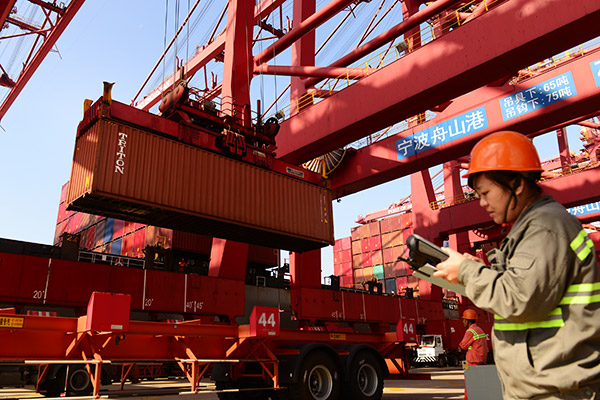China to be stabilizing power in new era


As with others who witnessed the birth of China's new era-in my case right in the Great Hall of the People-there was a sense of experiencing history in the making.
Communist Party of China Central Committee General Secretary Xi Jinping, in his three-and-a-half-hour-long speech to the 19th National Congress of the CPC, did not just set out a new domestic agenda but also provided a timetable for China to play a more central role on the world stage right until the middle of the century.
Now more than seven months on, how defining does that speech remain and how China and the world are interpreting Xi Jinping Thought on Socialism with Chinese Characteristics for a New Era?
Certainly, on the world stage, China was showing greater global leadership even before the CPC National Congress.
President Xi's speech to the World Economic Forum at Davos in January 2017 stressing the importance of globalization was in marked contrast to US President Donald Trump's isolationist "America First" stance-the speech being made just ahead of Trump's inauguration.
The Party Congress speech, however, gave many people the sense that China now had a defining grand strategy, not just domestically but also for its place in the world.
Former UK foreign secretary William Hague writing in his column in the Daily Telegraph earlier this month said this was no longer true of the West with the United States and Europe, in particular, divided on a number of global issues. He said it used to be a relief to open a bottle of wine with the foreign minister of either Australia or Canada and discuss the "strategy of the Western world".
While that was "hopeful but still realistic" three or four years ago, it would now seem "ridiculous" and this is because it is countries such as China that are setting the agenda, he said.
A vision of shared growth
Part of Xi's concept of globalization is the Belt and Road Initiative, which, he said in his report, was about a vision of a "shared growth" with the rest of the world. It was also emphasized at the Belt and Road Forum for International Cooperation in Beijing in May 2017 that it was not an instrument of China's foreign policy but something that all countries could participate in.
Ian Goldin, professor of globalization and development at Oxford University and a former economic adviser to Nelson Mandela when he was South African president, believes China's role on the world stage is the "watershed moment" of the new era. "President Xi was saying that the future of the Chinese people and of the Communist Party (of China) depended on a more active engagement with the rest of the world," Goldin said.
"This means a significant role for China in the global commons issues such as finance, trade, pandemics, climate change and cyber security. They all depend on cooperation and more active engagement in the world," he added.
Much of the success of the new era depends on China achieving three major goals.
The first is just two years away and that is to double China's 2010 per capita GDP by 2020 and for China to become a "moderately prosperous society", thus eliminating all extreme poverty in time for the 100th anniversary of the founding of the CPC in 2021.
This effectively involves China breaking out of the so-called middle-income trap that has befallen so many Latin American countries, in particular.


































